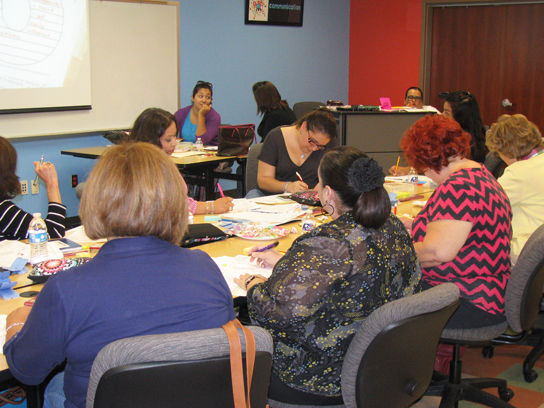HARLINGEN — Thunk.
He’s hit a wall.
He breaks out in a sweat, knowing he’ll never, ever, EVER pass this test.
He’s a failure. Just like last week when he was…
Whup.
Hold on a second. You’re having trouble passing the test, but you’re life isn’t over. These are just growing pains. It’s a challenge. I’m your teacher and I’m going to help you face it.
That’s the message Jennifer Maldonado, teaching and learning specialist for the Harlingen school district, extended to teachers who attended her workshop “Growing Pains” last week.
During the workshop, she spoke to teachers about creating a better classroom culture. It’s one of many workshops being held this summer at the school district administration building. The half-day workshops are for professional development for teachers. They aren’t required to attend.
Mike Travis wanted to know more about empowering students to succeed.
“I want to continue building on what I’ve already been doing in class, different ways to motivate the students and enhance their learning,” said Travis, who teaches Spanish at Coakley Middle School.
“Everybody can improve,” Travis said. “I am always open to new ideas and new approaches.”
The workshops are named after situation comedies. Besides “Growing Pains” with Kirk Cameron, other workshops are titled “The Big Bang,” “2 Broke Girls” and “Happy Days.”
A sizeable number of teachers have been attending the series of professional workshops which will continue into part of July. Teachers aren’t being paid to attend.
“We have a wonderful group of teachers,” said Veronica Kortan, administrator for organizational development. “It’s half days. But I have to say that every single one of those sessions have been filled with teachers just wanting to enrich and perfect their practice. And I think that says a lot about their dedication to the kids.”
The workshops are all aligned with the different domains in the new teacher evaluation system, Maldonado said. The evaluation is known as the T-TESS – the Texas Teacher Evaluation and Support System. Domain one evaluates planning. Therefore, some workshops show teachers better ways to plan. Another domain addresses classroom instruction. Still another evaluates the learning environment of a teacher’s classroom, hence the “Growing Pains” workshop.
Maldonado said this workshop focuses on changing a student’s outlook on results. A student who thinks a result can mean only one thing is more difficult to teach. Students who are willing to view things differently are more open to instruction. In other words, a bad grade is just a challenge. It’s an opportunity to find another way to learn specific subjects.
“It’s about someone with a fixed mindset versus someone with a growth mindset,” Maldonado said. “If we foster a growth mindset in students we can encourage them to continue to grow.”
Down the hall, Diana Ramirez talked to a room full of teachers about making connections across different aspects of reading and making connections within that reading. The ability to summarize a piece of text and make inferences, or understand implied information, are important skills, she said.
“It’s an awesome session,” said Ramirez, owner of DMR Educational Consulting.
She looked around the room at the teachers who were taking a quick break.
“They are taking notes like they are in a college class,” said Ramirez of Los Fresnos.
She’d been speaking to the instructors about teaching students how to process a story. She used a number of visual aids, starting with a photo of elephants walking across the Brooklyn Bridge to prove its safety. Then she produced a colorful children’s book about the elephants on the bridge to grab the children’s attention.
“It’s scaffolding,” she said. “The first thing is to warm up the children’s brains.”
Cynthia Cigarroa, who teaches fifth grade at Bowie Elementary, said Ramirez had a great presentation which was “hands-on.”
With words like “hands-on,” “authentic learning” and “real world learning,” it seems the big lesson here is the importance of “getting your hands dirty.” As is often said, there are astronomers and then there are astronauts. Teachers and students are learning how to be both. And even the astronauts can choose whether to aim for the moon, for Mars, or beyond.




